-
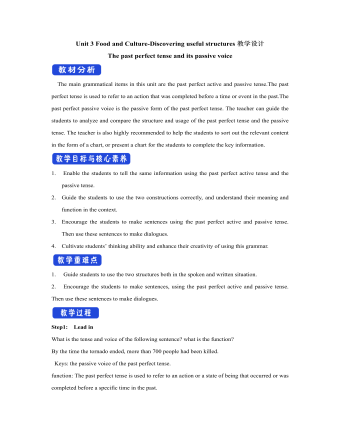
新人教版高中英语选修2Unit 3 Food and Culture-Discovering useful structures教学设计
The newspaper reported more than 100 people had been killed in the thunderstorm.报纸报道说有一百多人在暴风雨中丧生。(2)before、when、by the time、until、after、once等引导的时间状语从句的谓语是一般过去时,以及by、before后面接过去的时间时,主句动作发生在从句的动作或过去的时间之前且表示被动时,要用过去完成时的被动语态。By the time my brother was 10, he had been sent to Italy.我弟弟10岁前就已经被送到意大利了。Tons of rice had been produced by the end of last month. 到上月底已生产了好几吨大米。(3) It was the first/second/last ... time that ...句中that引导的定语从句中,主语与谓语构成被动关系时,要用过去完成时的被动语态。It was the first time that I had seen the night fact to face in one and a half years. 这是我一年半以来第一次亲眼目睹夜晚的景色。(4)在虚拟语气中,条件句表示与过去事实相反,且主语与谓语构成被动关系时,要用过去完成时的被动语态。If I had been instructed by him earlier, I would have finished the task.如果我早一点得到他的指示,我早就完成这项任务了。If I had hurried, I wouldn't have missed the train.如果我快点的话,我就不会误了火车。If you had been at the party, you would have met him. 如果你去了晚会,你就会见到他的。
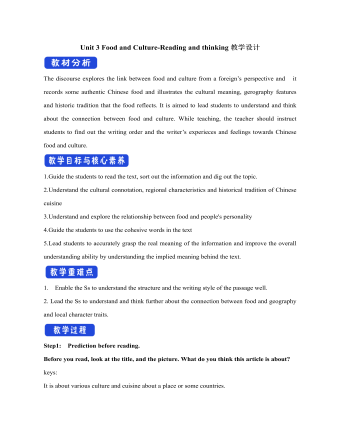
新人教版高中英语选修2Unit 3 Food and Culture-Reading and thinking教学设计
The discourse explores the link between food and culture from a foreign’s perspective and it records some authentic Chinese food and illustrates the cultural meaning, gerography features and historic tradition that the food reflects. It is aimed to lead students to understand and think about the connection between food and culture. While teaching, the teacher should instruct students to find out the writing order and the writer’s experieces and feelings towards Chinese food and culture.1.Guide the students to read the text, sort out the information and dig out the topic.2.Understand the cultural connotation, regional characteristics and historical tradition of Chinese cuisine3.Understand and explore the relationship between food and people's personality4.Guide the students to use the cohesive words in the text5.Lead students to accurately grasp the real meaning of the information and improve the overall understanding ability by understanding the implied meaning behind the text.1. Enable the Ss to understand the structure and the writing style of the passage well.2. Lead the Ss to understand and think further about the connection between food and geography and local character traits.Step1: Prediction before reading. Before you read, look at the title, and the picture. What do you think this article is about?keys:It is about various culture and cuisine about a place or some countries.
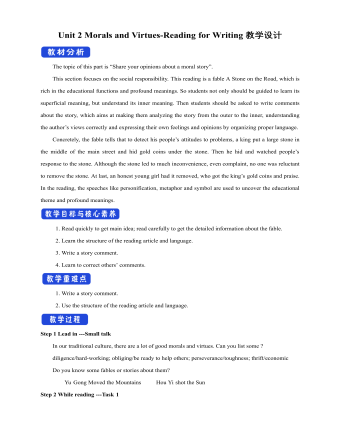
新人教版高中英语必修3Unit 2 Morals and Virtues-Reading for Writing教学设计
1. 这个寓言是一个关于一位国王古寓言。 The fable is an old fable about a king.2.作者用这个故事让读者对于社区的问题负有个人责任的必要印象深刻。The author used the story to impress upon readers with the need to take personal responsibility for problems in the community.3. 这个故事十分成功的实现了它的目的。The story was quite successful in achieving its purpose.Step 7 WritingPlease write a review of the story according the outline above.The fable is an old fable about a king who thought his people are lazy, so he put a large stone in the middle of the road and hides and waited to see if anyone will try to move it.The author used this story to impress upon readers with the need to take personal responsibility for problems in the community. The story was quite successful in achieving its purpose, and I liked it because it had a clear moral.However, while the moral of the story is clear, the actions of the king seemed pointless to me, because none of the characters in the story learnt anything. For this reason, I think there are better stories that can be used to impress upon people with the need for personal responsibility.Step 8 Pair workExchange drafts with a partner. Use this checklist to help your partner revise his/her draft.1. Does the writer give a short description of the story ?2. Does the description include the most important details of the story ?3. Does the writer give his or her opinion about the character or their actions ?4. Is the review well-organised ? 5. Does the writer use the -ing form as the adverbial correctly in the writing ?6. Are there any grammar, spelling, or punctuation errors ?Step 9 HomeworkPut up your revised draft in the classroom or read it to your class.
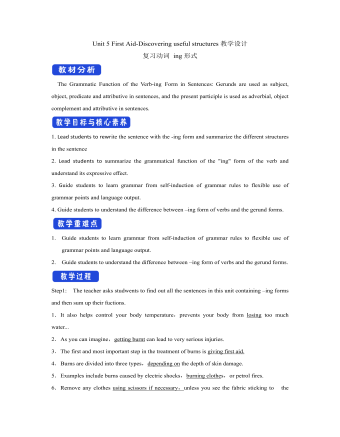
新人教版高中英语选修2Unit 5 First Aid-Discovering useful structures教学设计
You have no excuse for not going.你没有理由不去。He was punished for not having finished his homework.他因未完成作业而受到惩罚。2.动词ing形式复合结构由物主代词或人称代词宾格、名词所有格或普通格加动词ing,即“sb./sb.'s+doing”构成。动词ing形式的复合结构实际上是给动词ing形式加了一个逻辑主语。动词ing形式的复合结构有四种形式:①形容词性物主代词+动词ing②名词所有格+动词ing③代词宾格+动词ing④名词+动词ingHer coming to help encouraged all of us.她来帮忙鼓舞了我们所有人。The baby was made awake by the door suddenly shutting.这个婴儿被突然的关门声吵醒了。Can you imagine him/Jack cooking at home?你能想象他/杰克在家做饭的样子吗?无生命名词无论是作主语还是作宾语都不能用第②种形式。Tom's winning first prize last year impressed me a lot.汤姆去年得了一等奖使我印象深刻。Do you mind my/me/Jack's/Jack leaving now?你介意我/杰克现在离开吗?Excuse me for my not coming on time.很抱歉我没能按时来。His father's being ill made him worried.他父亲病了,他很担心。We are looking forward to the singer's/the singer to give us a concert.我们盼望着这位歌手来给我们举办一场演唱会。
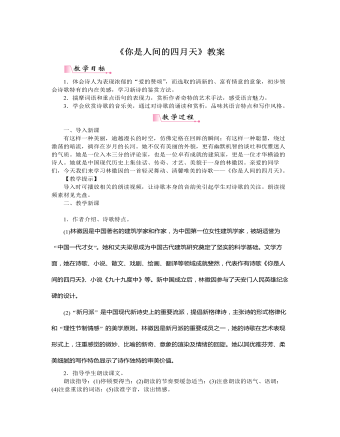
部编版语文九年级上册《你是人间的四月天》教案
第三节,把“爱”比作“四月的花”和“月圆”,表现了爱的美与庄严。第四节,用“雪化后那片鹅黄”“初放芽的绿”“白莲”表现了爱的生命力和纯净。第五节,“一树一树的花开”“燕子呢喃”表现爱之深,情之切。3.诗人通过不同的感官来描写“四月”所独有的景物,试结合内容进行分析。明确:通过视觉描写:“黄昏”“星”“云烟”“花”。通过听觉描写:“笑响”“四面风”“燕子呢喃”。通过触觉描写:“风的软”“暖”。多角度展开描写,表现了诗人的“爱之深,情之切”。能引导读者调动多种感官去感受诗人心中的“爱”,给读者以感染。【教学提示】指导学生结合诗人笔下的意象进行分析。目标导学三:品读诗句,把握诗歌艺术特色探究:“新月派”的重要成员之一闻一多先生曾提出了“三美原则”,即“音乐美、绘画美、建筑美”,奠定了新格律诗派的理论基础。本诗既是新格律诗的典范,它是否表现了“三美”原则?是如何表现的?
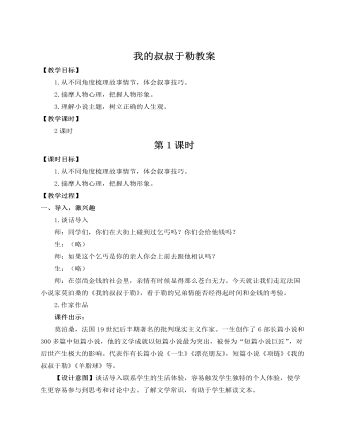
人教部编版语文九年级上册我的叔叔于勒教案
小说精心设计,以“我”回忆往事的视角来叙述,其他人物的态度和行动,都是从“我”的眼里看到的;对其他人物的感受和评述,也都是从“我”的角度表达的。这样写既有利于拉开适当的距离,为小说主题的展开留下空间,同时也有利于安排情节的曲折变化,避免多余的解释说明。【设计意图】内容决定形式,形式服务内容。在逐层深入理解课文时,穿插对写作技巧的讲解与点拨,要求学生在朗读中细细品味,有助于学生深入学习与运用。四、拓展,悟人生1.拓展阅读课外阅读《项链》。2.发散思维有一首歌里唱道:“有钱没钱,回家过年。”假如你是若瑟夫,当你走到于勒面前时,你会对他说些什么呢?【设计意图】学以致用,启迪人生智慧,形成正确的人生观、价值观。结束语:金钱扭曲了人性,撕裂了亲情。观照生活,思索人生,我们会发现亲情带来的温暖远胜于金钱,让我们一起说——让人间充满爱!
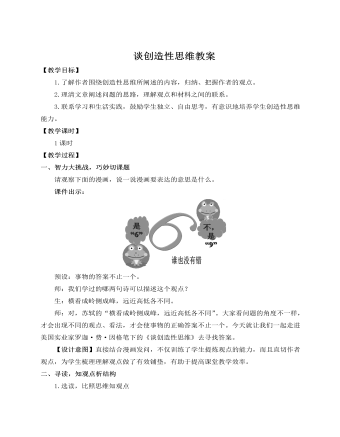
人教部编版语文九年级上册我爱这土地教案
教师:我们可以从诗歌运用“悲怆的诗句”去“反映热切的感情”角度去分析。教师指正:作为抒情的艺术,诗歌作品需要不断地强化自己的感情,以便能久久地拨动读者的心弦。这首诗中回荡着忧郁的调子,郁积着深深的忧伤。“为什么我的眼里常含泪水?/因为我对这土地爱得深沉…… ”句中交织着忧郁、悲怆之情,这种抒情基调是诗人敏感的心灵对民族苦难现实和人民悲苦生活的回应,是感情极度热切的反映。教师:我们可以从诗歌运用“强烈的对比”去“映射执着的爱”的角度去分析。教师指正:“假如我是一只鸟”全诗以这样一个出人意料的假设开头,使读者不禁发出疑问:“鸟”的形象和诗人所要歌颂的“土地”有着什么样的联系呢?这是诗人在开头留给我们的悬念。当读者为诗人不断歌唱的顽强生命力所吸引、折服时,诗篇却陡然来了一个大的转折——“我死了”,用身躯使土地肥沃,于是生前和死后形成了强烈的对比,而在这强烈的对比中一以贯之的是“鸟”对土地的执着的爱,这真是生于斯、歌于斯、葬于斯,至死不渝!至此开头的悬念也就解开了。
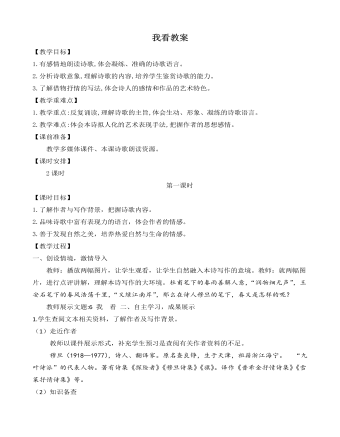
人教部编版语文九年级上册我看教案
预设1:用丰富的意象来隐喻和暗示诗人的内心世界。这首诗以鲜明深邃的诗歌意象传达情感,阐述思想。诗歌中的大量意象可谓是形、神兼备,形、情兼备,形、理兼备。如:这首诗中的意象主要有向晚的春风、丰润的青草、展翅的飞鸟、深远的晴空、被夕阳染红的流云、沉醉了的大地。预设2:富有节奏美和音乐美。全诗一共五节,第1节押ao韵;第2节押i韵;第3节第一句承第2节的i韵,又换韵为a韵;第4节又换韵为i;第5节又换韵为iu和i。读起来朗朗上口,富有音乐美。预设3:首尾照应,结构严谨。第5节的“天风”“鸟的歌唱,云的流盼,树的摇曳”照应了第1节和第2节;“欢笑和哀愁洒向我心里”又照应了第3节的“逝去的多少欢乐和忧戚”;“像季节燃起花朵”又照应了第1节的“春”。处处照应,使全诗成为一个有机的整体,又使情感抒发得很强烈。五、诗歌深读,学后感悟
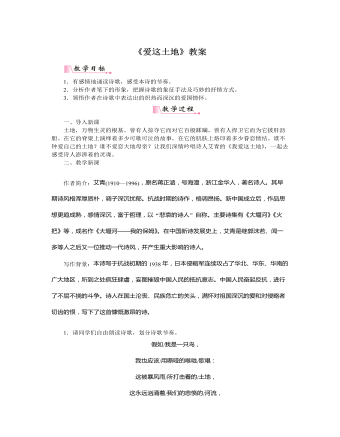
部编版语文九年级上册《我爱这土地》教案
目标导学四:赏析作品,把握诗歌艺术特色1.这首诗在结构上共分两节,请简要说说两节诗歌各有什么特点及它们之间的内在联系。明确:诗的第一节是从虚拟的视角,即从鸟儿的视角去想象,去表现鸟儿对土地的忠诚与挚爱,显得形象含蓄;第二节却换成实写的视角,即从作者自我的视角去实写自己“常含泪水的眼睛”,倾诉自己对土地的“深沉”之爱,是直抒胸臆。这样,虚境和实境的结合与对应,构筑了全诗内在完整的艺术空间;结果与原因的关联与对照,又构成了支撑全诗的内在逻辑结构。此外,从手法特点上看,第一节用的是比,是想象的境界;第二节则是直抒胸臆的写实。全诗由前面蒙太奇镜头式的画面暗示转到了后面作者的直接指点,以一个强有力的情感抒发结束了全篇,从而把注意力引到一个浓郁的情感氛围中,再一次感受到作者对土地的忠贞与挚爱。
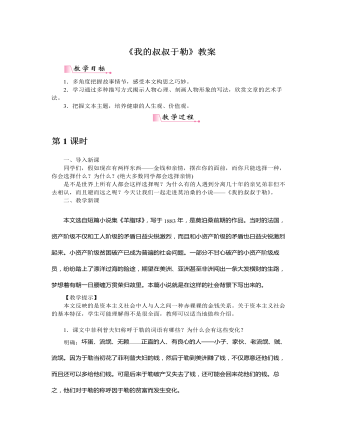
部编版语文九年级上册《我的叔叔于勒》教案
分析:“褴褛”一词是对于勒的外貌描写,点明他生活的贫困,处境的艰难。②他又老又脏,满脸皱纹,眼光始终不离开他手里的活儿。分析:再次描写于勒的外貌,充分说明他历尽磨难,饱经沧桑,穷困潦倒。③我看了看他的手,那是一只满是皱纹的水手的手。我又看了看他的脸,那是一张又老又穷苦的脸,满脸愁容,狼狈不堪。分析:第三次描写于勒的外貌,准确地表现出他此时的穷困潦倒,暗示他不幸的遭遇,竭力渲染他的悲惨境地。2.本文通过神态、语言、动作描写揭示人物心理活动,刻画人物性格,找出这些句子来进行分析。明确:菲利普认出卖牡蛎的穷水手就是于勒时,“突然好像不安起来”,这是心理骤然紧张所致;“他向旁边走了几步”,是想躲开于勒的目光,怕于勒认出自己来;“瞪着眼”看女儿、女婿,是怕他们察觉出这个秘密。这一系列神态、动作描写,层次分明地写出了人物紧张、恐慌以至失魂落魄的心理状态。
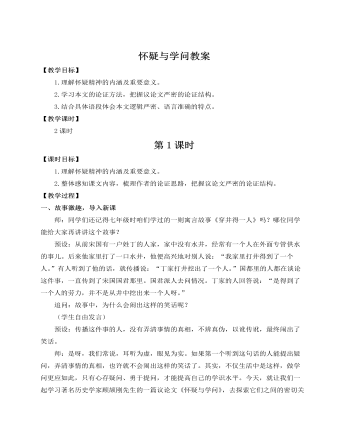
人教部编版语文九年级上册怀疑与学问教案
1.理解怀疑精神的内涵及重要意义。2.整体感知课文内容,梳理作者的论证思路,把握议论文严密的论证结构。【教学过程】一、故事激趣,导入新课师:同学们还记得七年级时咱们学过的一则寓言故事《穿井得一人》吗?哪位同学能给大家再讲讲这个故事?预设:从前宋国有一户姓丁的人家,家中没有水井,经常有一个人在外面专管供水的事儿。后来他家里打了一口水井,他便高兴地对别人说:“我家里打井得到了一个人。”有人听到了他的话,就传播说:“丁家打井挖出了一个人。”国都里的人都在谈论这件事,一直传到了宋国国君那里。国君派人去问情况。丁家的人回答说:“是得到了一个人的劳力,并不是从井中挖出来一个人呀。”追问:故事中,为什么会闹出这样的笑话呢?(学生自由发言)预设:传播这件事的人,没有弄清事情的真相,不辨真伪,以讹传讹,最终闹出了笑话。
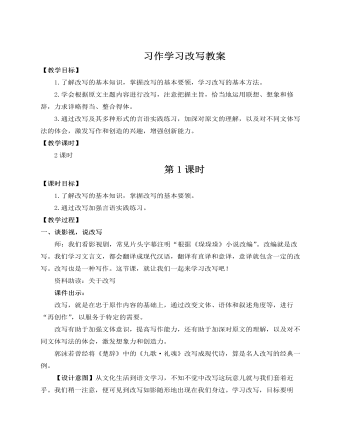
人教部编版语文九年级上册写作学习改写教案
有一天正午正走在黄泥冈上,他们又要喊歇,我自知这一带劫匪出没甚多,便催促他们快走,可他们却坐在地上不动了,任凭我怎样拿鞭抽打,他们也不起来,无奈之下,只得让他们歇会儿。不一会儿,来了一个卖酒的人过来,有人要买酒。被我阻止了,我说这酒里不知放了什么,还是不要喝的好。又一会儿来了几个贩枣的客商,先买了一桶酒,又把另一桶打开喝了一瓢。另一个客人见了,也拿瓢来舀酒。卖酒的见了,抢过瓢来,劈手将酒倒在桶里。殊不知,就在这时,蒙汗药被放进了桶里。老总管过来问我:“杨提辖,你看他们喝了都没事,我们也渴了,就买点吧。”我思量着,这一桶也被喝过,应该没事,只得同意了。于是他们便冲上去买酒,有人还给了我一瓢,我接下来喝了。这时我看他们一个个都头重脚轻栽倒在地上,心里暗叫:不好,中计了。但再想站起来,已经不可能了,看见那群“商人”,一个个笑着,我真是懊悔,没让队伍继续走,还有那些不听我话的人,为什么不听我话,又一次任务失败了,回去怎么交代……不一会儿我眼前一片漆黑,什么也不知道了。醒来后,周围一个人也没有,而生辰纲果然不见了,无奈之下,我只能逃走,却不知何处是终点……
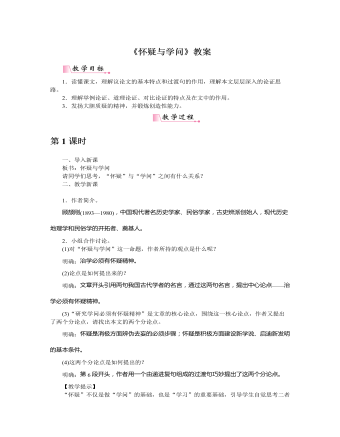
部编版语文九年级上册《怀疑与学问》教案
一、复习回顾、引入新课上节课,我们学习了《怀疑与学问》的内容,也学习了议论文结构的基本特征以及常用的论证方法,这节课我们重点学习议论文在论证论点过程中说理的层次,还要进一步理解议论文分析事理透辟,语言严密的特点。二、教学新课目标导学一:探究说理的层次,明确各段之间的关系请同学们细读课文,边读边思考句与句之间的关系,分组完成以下问题。1.本文论点是“治学必须有怀疑精神”,作者是如何阐述怀疑精神的?明确:对怀疑精神作者阐述得明确而透彻:所谓疑就是决不轻信,经过思考,分清是非,再决定信与不信;进而把怀疑科学地分为“怀疑”“思索”“辨别”三步。2.结合课文思考:作者是如何阐述“从怀疑到创新”这一治学过程的?明确:作者在进一步论证“怀疑是建设新学说、启迪新发明的基本条件”时,又把怀疑到创新的治学过程分析为“怀疑、辩论、评判、修正、创新”。作者通过举例、正反说理,使内容阐述得鞭辟入里,无懈可击。
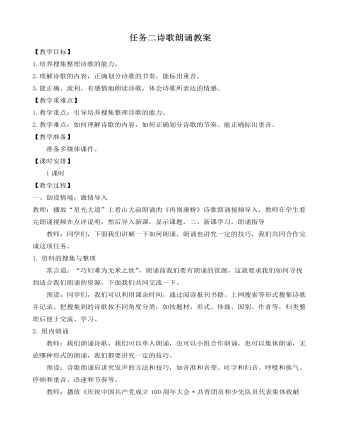
人教部编版语文九年级上册任务二诗歌朗诵(2)教案
1.主持人致开幕词。2.参赛选手按时到场、抽签。3.主持人介绍比赛规则和评分细则。(1)分年级比赛,各年级同时进行,并根据相同的评分标准来评奖。(2)比赛规则:①参赛选手须使用普通话,尽可能脱稿朗诵,并富有感情色彩,辅以丰富的肢体语言;②每位选手比赛时间限定在3-5分钟,如果超时或不足,评委将适当扣分;③比赛顺序由抽签决定,中途不得变更顺序,比赛需紧凑进行,选手上场迟到2分钟以上则视为弃权;④参赛选手须严格遵守比赛规则,在比赛过程中若有异议,由评委会裁定。4.主持人报幕,请选手上台朗诵。5.比赛结束后,邀请评委上台发言,工作人员进行统分。6.主持人宣布比赛结果,请嘉宾为获奖者颁奖。7.主持人宣布本次比赛结束,请嘉宾和评委退场。四、课后巩固,布置作业1.布置学生课后搜集艾青的一篇经典的、适合个人朗诵的诗歌,在课下作朗诵练习。
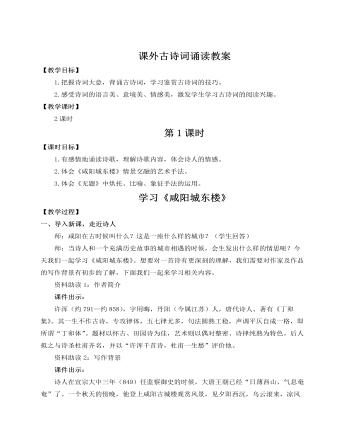
人教部编版语文九年级上册课外古诗词诵读(二)教案
课件出示:少年时指青年时期,从辛弃疾的生平看,这时的他正处于金人统治区内,看到沦陷区的人们在异族的奴役之下,作为血气方刚的爱国青年,油然而生收复失地的报国之志。因而这时的愁情也是真实存在的,那就是对沦陷区人民的同情,对国土沦丧的耻辱感,这时的愁,更多的是一种渴望收复中原、建立不世功业的志愿和动力,是昂扬而充满激情的。2.深入思考,体会“愁”的含蓄之美(1)比较少年时登楼与而今登楼的目的有何不同?预设:少年时登楼,是为了登高望远,抒发自己的豪情壮志。而今登楼,是为了排遣内心的悲愤之情。(2)是什么原因使词人“欲说还休”?预设:统治者处处排挤、打击他,他处处受猜忌,所以有愁不敢说。更主要的原因是,一生抱负付之流水,鬓发苍苍,功业无成,而又没有知音,无人理解。这种孤独的愁情,跟谁诉说,说了又有什么用,这中间也包含着对南宋朝廷的无限失望。因为这种失望,所以辛弃疾“欲说还休”。
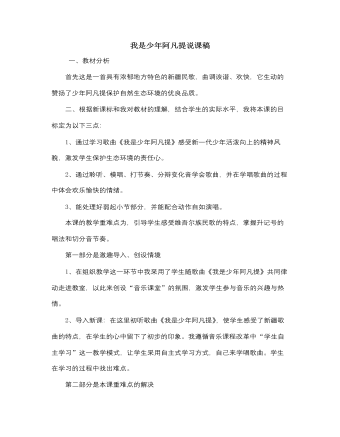
人音版小学音乐四年级下册我是少年阿凡提说课稿
紧接着是升记号的认识。在这里我把升记号介绍给学生,教师先用电子琴演奏没有升记号的乐句,再演奏有升记号的乐句,学生听一听那一个音有变化。然后教师再分别把单独的有变化的一个音拿出来进行比较,最后用键盘图在幻灯片上展示。使学生更直观的去听去感受,使学生听觉与视觉互补。增强学生的参与意识,使复杂乏味枯燥的音乐知识变的趣味化,生动化,通过师生的共同参与,更加拉近了教师与学生的距离。最后是编创与活动.由于这首歌是以环保为主题,所以我用音乐与环境保护有机结合的融合,从而进行德育渗透,通过生生合作、和自主探究的方式来进行编创歌词。最后让学生用载歌载舞的形式表现歌曲.依托音乐本身的魅力培养学生主动学习,合作意识,探究精神,从目标的提出到过程的安排,学习方法的确定乃至学习成果的呈现,都让学生有更大的自主性,更多的实践性,更浓的创造性。
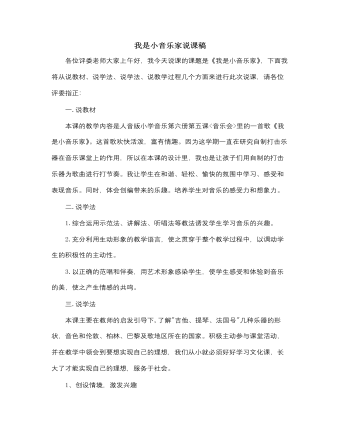
人音版小学音乐三年级下册我是小音乐家说课稿
都说教学是一门遗憾的艺术,在总结这堂课优点的同时我也清醒地认识到了自己的不足。比如在歌曲教学中,有不少节奏难点,如"0勃隆︱砰砰砰勃隆︱砰砰砰"中的八分休止符及十六分音符节奏的弱起衬词"勃隆",是比较难处理的,虽然通过反复的听唱,学生掌握得比较到位,但是我觉得是缺少解决方法的。课后我在思考,如果为了不让学生将"勃隆"两字常到强拍位置而让学生只唱"砰砰砰",将八反休止符及"勃隆"放在心里默唱,这样,更能确定"砰砰砰"的准确拍位,同时在默唱时也能聆听"勃隆"两字的弱起感觉。又比如在"跳?哟唱哟"这一字多音的乐句,处理最不好,尽管我进行了多次范唱,节奏仍有错误,学生还是很明显地将"跳?哟唱哟"唱成了"跳哟唱哟"。课后我思考在教学生唱"跳"字时做一个伸懒腰的动作,并在"531︱21︱"中的"3"音处加个"ao"音,节奏,那么难点解决了嘛!
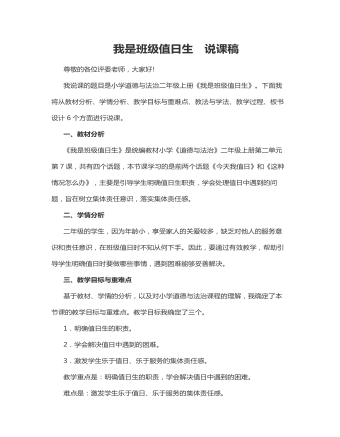
我是班级值日生 说课稿
一、教材分析《我是班级值日生》是统编教材小学《道德与法治》二年级上册第二单元第7课,共有四个话题,本节课学习的是前两个话题《今天我值日》和《这种情况怎么办》,主要是引导学生明确值日生职责,学会处理值日中遇到的问题,旨在树立集体责任意识,落实集体责任感。二、学情分析二年级的学生,因为年龄小,享受家人的关爱较多,缺乏对他人的服务意识和责任意识,在班级值日时不知从何下手。因此,要通过有效教学,帮助引导学生明确值日时要做哪些事情,遇到困难能够妥善解决。三、教学目标与重难点基于教材、学情的分析,以及对小学道德与法治课程的理解,我确定了本节课的教学目标与重难点。教学目标我确定了三个。1.明确值日生的职责。2.学会解决值日中遇到的困难。3.激发学生乐于值日、乐于服务的集体责任感。教学重点是:明确值日生的职责,学会解决值日中遇到的困难。难点是:激发学生乐于值日、乐于服务的集体责任感。四、教法与学法为了实现本课的教学目标,突出重点、突破难点,我将以活动为教学的主要组织与实施形式,引导学生在活动中感受、体验、领悟,在活动中提出问题、解决问题,落实行为实践;在学法上,主要采用小组合作、自主探究的方法。
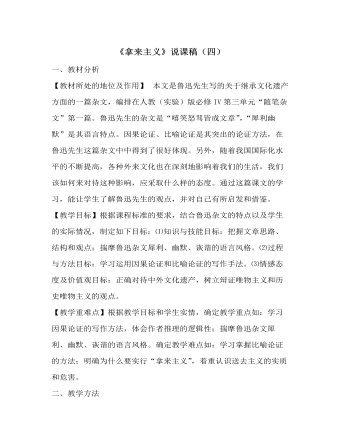
《拿来主义》说课稿(四) 统编版高中语文必修上册
【教学目标】根据课程标准的要求,结合鲁迅杂文的特点以及学生的实际情况,制定如下目标:⑴知识与技能目标:把握文章思路、结构和观点;揣摩鲁迅杂文犀利、幽默、诙谐的语言风格。⑵过程与方法目标:学习运用因果论证和比喻论证的写作手法。⑶情感态度及价值观目标:正确对待中外文化遗产,树立辩证唯物主义和历史唯物主义的观点。【教学重难点】根据教学目标和学生实情,确定教学重点如:学习因果论证的写作方法,体会作者推理的逻辑性;揣摩鲁迅杂文犀利、幽默、诙谐的语言风格。确定教学难点如:学习掌握比喻论证的方法;明确为什么要实行“拿来主义”,着重认识送去主义的实质和危害。二、教学方法教学应坚持“以学生为主体”的原则,尽可能发挥学生学习的能动性和主动性,培养学生独立思考的能力,调动学生学习积极性,因此本文采用“疑问教学法”相对合适。
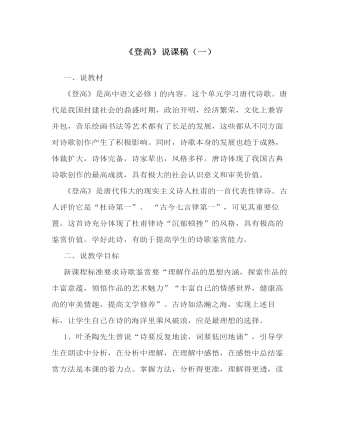
《登高》说课稿(一) 统编版高中语文必修上册
学生借助对对联的赏析,回味杜甫穷年漂泊的一生,体会杜甫作为一个深受儒家思想影响的读书人,忠君念阙,心系苍生的伟大情怀。(这一设计理念源于孟子所云:“诵其文,读其诗,不知其人,可乎?是以论其世也。”知人论世是鉴赏诗歌的第一步 )(二)研读课文1、初读,朗读吟诵,感知韵律美。要求学生读准字音,读懂句意,体会律诗的节奏、押韵的顺畅之美。2、再读,披词入情,感受感情美。让学生用一个字概括这首诗的情感内容。(此教学设计是从新课标要求的文学作品应先整体感知,培养学生归纳推理的逻辑思维能力出发进行的设计。)其答案是一个“悲”字,由此辐射出两个问题:诗人因何而“悲”?如何写“悲”?(此问题设计顺势而出,目的在于培养学生探究问题的能力。)





















